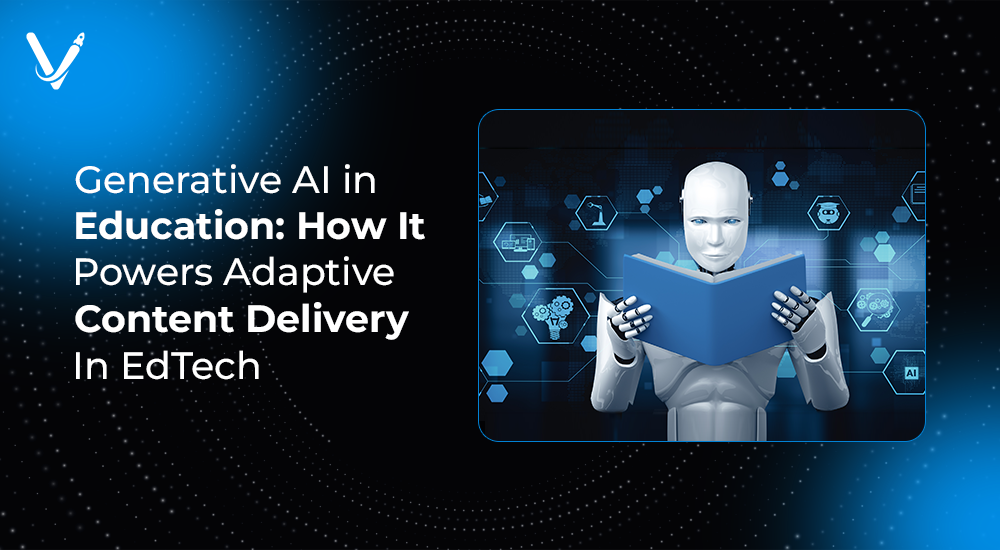Generative AI in Education: How It Powers Adaptive Content Delivery in EdTech


- Apr 29, 2025



Generative AI in education is revolutionizing traditional learning methodologies by introducing highly personalized and adaptive learning experiences. Educational technology (EdTech) companies harness the power of artificial intelligence applications in education to create customized educational content tailored to individual student needs, fostering enhanced learning outcomes and engagement.
This article delves deeply into how generative AI powers adaptive content delivery, offering real-world examples, actionable insights, and a clear understanding of its transformative impact on education as an industry.
Generative AI refers to AI models capable of creating content autonomously. In education, these sophisticated systems dynamically generate learning materials, quizzes, interactive modules, and comprehensive feedback. Unlike static educational resources, generative AI adapts instantly, providing highly relevant content personalized to individual student performance and learning pace.
At its core, generative AI utilizes machine learning algorithms and neural networks, particularly generative adversarial networks (GANs) and transformer models like GPT-4. These technologies analyze vast amounts of educational data to predict learning patterns, enabling precise and personalized content creation.
Artificial intelligence significantly enhances student engagement and learning effectiveness by personalizing content. AI-driven platforms analyze students' strengths, weaknesses, learning styles, and preferences to tailor educational materials uniquely suited to each individual.
AI identifies knowledge gaps and creates tailored lesson plans and content delivery schedules, ensuring each student progresses effectively without unnecessary repetition.
Adaptive content keeps students motivated and engaged through interactive learning experiences such as virtual reality simulations, gamified activities, and dynamic multimedia presentations.
Integrating generative AI in education provides numerous benefits that significantly improve both teaching methods and student performance.
AI-generated adaptive content targets specific learning objectives, enhancing student comprehension and academic performance.
Educators benefit from AI by automating content creation and assessment, freeing time to focus on direct student interactions and complex teaching tasks.
AI-driven adaptive content ensures equitable education access by catering to diverse learning needs, including students with disabilities or learning differences, fostering a more inclusive educational environment.
Several leading EdTech platforms showcase the profound impact of generative AI in delivering adaptive learning experiences.
Duolingo employs generative AI to create adaptive language lessons that personalize grammar, vocabulary, and pronunciation practice based on real-time performance metrics.
This EdTech firm uses generative AI-driven adaptive software to personalize mathematics instruction, enhancing student mastery through precise interventions.
Coursera's adaptive learning platform utilizes generative AI to recommend courses, quizzes, and supplemental resources tailored to individual learner profiles.
Educational institutions looking to adopt generative AI should consider several critical steps for successful implementation:
Establish clear goals for AI integration, such as improved student outcomes, resource efficiency, or enhanced student engagement.
Partner with a reputable AI development company to select appropriate generative AI technologies tailored to institutional needs.
Provide comprehensive training to educators to maximize the benefits of AI-driven educational technologies effectively.
Begin with pilot programs, gather feedback, adjust accordingly, and then scale successful AI implementations across the institution.
Despite its benefits, implementing generative AI in education involves challenges like data privacy, ethical considerations, and potential biases.
The future of generative AI in education is poised for remarkable growth, driven by continuous technological advancements and innovative educational methodologies. AI technology is expected to become even more sophisticated, with deeper integration into daily educational practices, thereby significantly transforming how educators teach and students learn.
In the coming years, we can expect to see generative AI further enabling personalized learning on an unprecedented scale, empowering educators to provide customized curricula that dynamically adapt to each student's evolving educational needs. Institutions adopting these advanced technologies early will undoubtedly gain competitive advantages by offering superior educational outcomes, enhancing student satisfaction, and positioning themselves as forward-thinking educational leaders.
Generative AI is undeniably transforming education as an industry, offering unparalleled adaptive learning opportunities tailored to individual student needs. Through personalized content delivery, increased engagement, and improved educational outcomes, generative AI holds immense potential for future education systems. To leverage these benefits, partner with a leading AI development company like Vasundhara Infotech and explore how adaptive generative AI solutions can revolutionize your educational offerings.
Ready to transform your educational institution with cutting-edge AI solutions? Connect with us today!
Copyright © 2026 Vasundhara Infotech. All Rights Reserved.